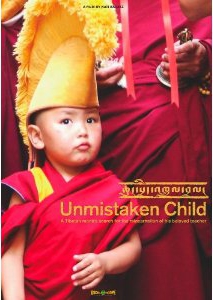A tulku is a distinctive and significant aspect of Tibetan Buddhism, embodying the concept of enlightened beings taking corporeal forms to continue the lineage of specific teachings. The term "tulku" has its origins in the Tibetan word "sprul sku", which originally referred to an emperor or ruler taking human form on Earth, signifying a divine incarnation. Over time, this term evolved within Tibetan Buddhism to denote the corporeal existence of highly accomplished Buddhist masters whose purpose is to ensure the preservation and transmission of a particular lineage.

Thubten Yeshe (1935–1984) was a Tibetan lama who, while exiled in Nepal, co-founded Kopan Monastery (1969) and the Foundation for the Preservation of the Mahayana Tradition (1975). He followed the Gelug tradition, and was considered unconventional in his teaching style.
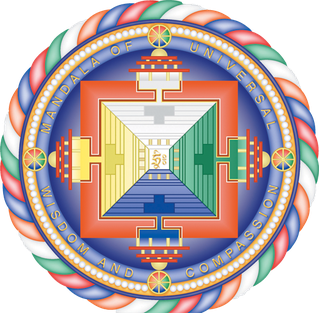
The Foundation for the Preservation of the Mahayana Tradition (FPMT) was founded in 1975 by Gelugpa Lamas Thubten Yeshe and Thubten Zopa Rinpoche, who began teaching Tibetan Buddhism to Western students in Nepal. The FPMT has grown to encompass over 138 dharma centers, projects, and services in 34 countries. Lama Yeshe led the organization until his death in 1984, followed by Lama Zopa until his death in 2023. The FPMT is now without a spiritual director; meetings on the organization's structure and future are planned.

Tenzin Ösel Hita y Torres is a Spanish Tibetan Buddhist tulku and spiritual teacher. Born Ösel Hita Torres to María Torres and Francisco Hita, he was designated soon after his birth as the tulku or reincarnation of Thubten Yeshe — making him one of only a handful of Western tulkus — and renamed Tenzin Ösel.(Tibetan: བསྟན་འཛིན་འོད་གསལ་རིན་པོ་ཆེ།)

Gaden Tharpa Choling Monastery is a Gelugpa monastery situated at the hilltop in Kalimpong, India. The monastery was founded by Domo Geshe Rinpoche Ngawang Kalsang in 1912. History says that Domo Geshe Rinpoche lived in Kalimpong in 1906 when he came to India for pilgrimage and to collect medicinal plants from India, Nepal and Bhutan. At the request of the Tibetan merchants and some Bhutanese leaders living in Kalimpong to establish a monastery there, Rinpoche instituted this monastery. Gaden Tharpa Choling monastery is a non-profitable development Association, registered under the West Bengal Societies Registration Act, 1961.

Old Ghoom Monastery is the popular name of Yiga Choeling. The monastery belongs to the Gelukpa or the Yellow Hat sect and is known for its 15 feet (4.6 m)-high statue of the Maitreya Buddha. The external structure of the building was established in 1850 by the Mongolian astrologer and monk Sokpo Sherab Gyatso, who was head of the monastery until 1905.
Lhundub Sopa was a Tibetan monk.
Khunu Lama Tenzin Gyaltsen, 1894–1977, known also as Negi Lama Tenzin Gyaltsen, Tenzin Gyaltsen, and various other names like Kunu Rinpoche, Kunu Lama and Negi Lama, was born in 1894 in the village of Sunam which lies in the Kinnaur district of India in the western Himalayas. He passed away at the age of 82 at Shashur Monastery in the Lahaul and Spiti district of Himachel Pradesh on February 23, 1977, while teaching the final page of Gampopa's Jewel Ornament of Liberation. Khunu Rinpoche was not officially recognized as a tulku, nor was he an ordained Buddhist monk, but a layman who had taken lay practitioner's vows before becoming a Tibetan Buddhist master.

Amitabha Buddhist Centre is a Buddhist institution in Geylang, Singapore. It is affiliated with the Foundation for the Preservation of the Mahayana Tradition (FPMT), an international non-profit organisation, founded by Lama Thubten Yeshe.
Thekchen Choling is a registered Buddhist organisation in the Republic of Singapore. The organisation was started in 2001 by Singha Thekchen Rinpoche and a group of his initial disciples. The organisation promotes non-sectarian Buddhism, emphasizing understanding of Theravada and Mahayana teachings. TCCL is committed to the Rime (non-sectarian) movement within Tibetan Buddhism though it is of the Gelug tradition. The primary practices and teachings of this temple are from Guru Rinpoche lineage and Lama Tsongkapa lineage.
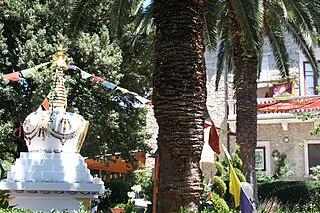
The Istituto Lama Tzong Khapa (ILTK) in Pomaia, a village in Tuscany, in Italy (40 km south of Pisa) is a branch of the Foundation for the Preservation of the Mahayana Tradition (FPMT), an international network of Gelugpa dharma centers. It is named for Tsongkhapa, founder of the Gelugpa monastic order of Tibetan Buddhism. The Dalai Lama has taught there on several occasions.
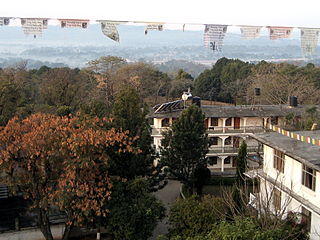
Lobsang Gyatso (1928–1997) was a Tibetan monk who founded the Institute of Buddhist Dialectics in Delhi, India.
Geshe Lama Konchog, born Lobsang Puntsog, was a Tibetan Buddhist lama of the Gelug school, who had thousands of followers around the world. Konchog was recognized by the Dalai Lama to be a Mahasiddha, or realized guru.
Geshe Tenzin Zopa is a Tibetan Buddhist monk of the Mahayana tradition. He is the resident teacher of the Losang Dragpa Centre of the Foundation for the Preservation of the Mahayana Tradition (FPMT). Zopa is featured in the 2008 documentary film Unmistaken Child, which follows his search for the reincarnation of his beloved master, Geshe Lama Konchog. Zopa has also written a book about this search, titled Precious Holy Child of Kopan.
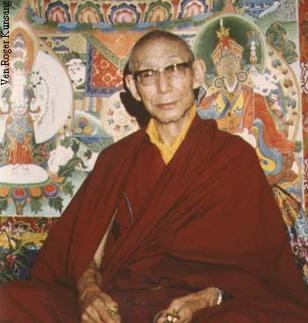
The Third Trijang Rinpoche, Lobsang Yeshe Tenzin Gyatso (1901–1981) was a Gelugpa Lama and a direct disciple of Pabongkhapa Déchen Nyingpo. He succeeded Ling Rinpoche as the junior tutor of the 14th Dalai Lama when the Dalai Lama was nineteen years old. He was also a lama of many Gelug lamas who taught in the West including Zong Rinpoche, Geshe Rabten, Lama Yeshe, Kelsang Gyatso, and Lama Zopa Rinpoche. Trijang Rinpoche's oral teachings were recorded by Zimey Rinpoche in a book called the Yellow Book.

Tulku is a 2009 documentary film, written and directed by Gesar Mukpo. The film details the personal experiences of five young Western men who were identified in childhood as being tulkus, or reincarnated Tibetan Buddhist masters.
The Young Lamas Home School was a school established by the 14th Dalai Lama and Freda Bedi in 1960. Its funding was provided by Christopher Hills and its early abbot was Karma Thinley Rinpoche.

(Kyabje) Choden Rinpoche was a contemporary yogi-scholar of the Gelugpa school of Tibetan Buddhism and a reincarnation ('sprul-sku') of the Choden lineage, the historical abbots of Rabten Monastery (Tibetan: རབ་བརྟེན་དགོན་པ, Wylie: in Rong-bo district, Kham.
Tenzin Phuntsok Rinpoche, also called Tenzin Nyudrup, is the recognised reincarnation of the Tibetan Mahasiddha Geshe Lama Konchog, who died in 2001.

Geshe Rabten (1921–1986) was a Tibetan geshe born in Tibet.
